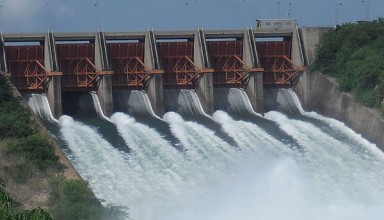New legislation might mean more water for farmers
By Victor Martino
Senator Dianne Feinstein (D-California) introduced legislation on June 20 that if passed in both the U.S. Senate and U.S. House of Representatives and signed into law by President Trump could significantly improve the water supply for farming in California.
The comprehensive bipartisan legislation, the Drought Resiliency and Water Supply Infrastructure Act, which is co-authored by Senator Cory Gardner (R-Colorado), Martha McSally (R-Arizona) and Kyrsten Sinema (D-Arizona), would authorize federal funding for new water storage; recycling and desalination projects; create a loan program for water supply projects; enhance forest restoration; and authorize other actions designed to benefit water development, supply and quality nationally and in California.
For example, the legislation provides $670 million over 5 years to create new groundwater storage projects.
Additionally, the bill funds a new loan program for water agencies at 30-year Treasury interest rates (currently 2.6%) to spur investment in new water supply projects, which could greatly enhance the availability of irrigation water for farmers in California
The legislation doesn’t take for granted the fact 2019 has been a wet year in The Golden State. Instead, the bill focuses on the historical drought cycle in California and the West, as well as the continued crisis facing water reliability in the Western U.S., which is something the California Farm Bureau Federation (CFBF), which backs the legislation, has been lobbying for.
The CFBF is endorsing the Drought Resiliency and Water Supply Infrastructure Act, according to Jamie Johansson, the association’s president.
“We thank Senator Feinstein for her ongoing efforts to improve the water outlook in California and throughout the Western U.S.,” Johansson said. “In this decade alone, California has experienced severe drought and torrential rainfall, and experts believe that may be the future trend for our state. That means we must improve investment in water projects to capture water when it’s available,” he said.
Johansson added that the bill would make investments in water infrastructure more attractive and affordable for state, regional and local agencies in California and elsewhere.
The legislation has a strong chance of passing in the Senate — it then goes on to the U.S. House of Representatives if passed – because of its bipartisan nature, along with the fact it has provisions that could entice non-farm state elected officials to support it.
Those provisions include $100 million for water recycling projects and $140 million for habitat restoration and environmental compliance projects, including forest, meadow and watershed restoration projects that benefit threatened and endangered species. Both provisions have appeal to environmentalists, who will also weigh-in on the legislation.
Assuming the bill becomes law, the tough slog here in California will be getting the many competing interests – urban, rural, agriculture, environmentalists and others – to agree on constructing new water storage facilities, which basically means dams and reservoirs, both of which regularly meet organized opposition in the Golden State.
Governor Newsom though has indicated he isn’t opposed to building new water storage in California, which along with the fact the legislation is authored by California’s powerful senior Senator Dianne Feinstein and is bipartisan might help in the effort to create much-needed new water storage facilities and conveyances in the state.
Even though California has had one of its wettest years on record, farmers in the agriculture-rich Central Valley are only being given a 75% water allotment for irrigation, which is higher than in past years but is less than the 85% the state is allowing for other uses like commercial and residential outdoor irrigation.
There’s clearly a need for more water storage and related infrastructure in California for farming. Drought will come again. The Drought Resiliency and Water Supply Infrastructure Act is a good step on the federal level to address this reality.
More needs to be done on the state level as well.
Climatologists estimate 75% of California’s rain water is wasted. The state needs to get creative and set a goal to start capturing a significant portion of this runoff. This year’s wet winter dumped 18 trillion gallons of rain on California in February alone. Even if the state had only the capacity to capture an extra 10% of that one month total the result would be significant.
Senator Feinstein says longer and more severe droughts than we’ve had in the past, which could easily come in the future, will change the face of California, undermine our economy, devastate our agriculture sector and require draconian water restrictions. To counter this, she says, “we must act now, and this bill will help toward that goal.”
The CFBF, which represents most of the state’s farmers and agriculture interests, agrees.







